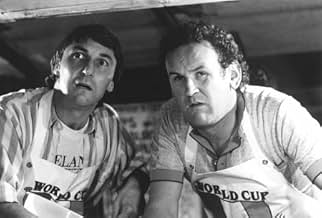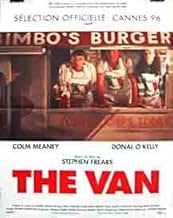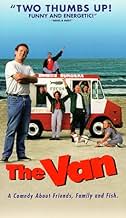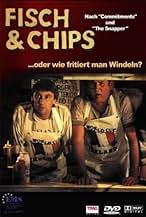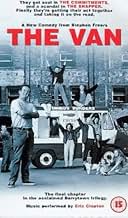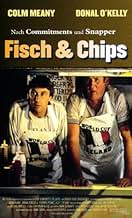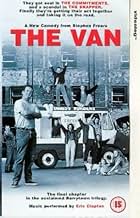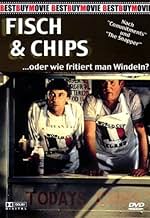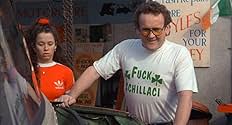Ajouter une intrigue dans votre langueSet in the fictional Dublin suburb of Barrytown, Bimbo is a baker who loses his job after being made redundant. Bimbo then acquires the help of his best friend, Larry, to set up a successful... Tout lireSet in the fictional Dublin suburb of Barrytown, Bimbo is a baker who loses his job after being made redundant. Bimbo then acquires the help of his best friend, Larry, to set up a successful burger van.Set in the fictional Dublin suburb of Barrytown, Bimbo is a baker who loses his job after being made redundant. Bimbo then acquires the help of his best friend, Larry, to set up a successful burger van.
- Récompenses
- 1 nomination au total
Avis à la une
Two Irish men with wives and children find themselves on the dole. One of them buys a large van and turns it into a "chippy." Naturally, he asks his best friend to work there with him. These two approaching-middle-age men have to work incredibly hard, but do have some success at the venture. It doesn't take long, however, for the friendship to get in the way. The one who fronted the money for the van is the boss, and the other one who didn't put up any money to get the small business going is the employee, who eventually becomes bitter at drawing a weekly paycheck from his best friend, who joins a union and begins antagonizing his best friend about labor laws, and whose insecurity in life shows clearly -- after all, the job isn't glamorous by any means, and of course, the reality of it is far removed from his dreams, we should imagine. The tension grows between the two. Set in Ireland during a World Cup Finals competition in soccer, this film gives us an intimate, grungy peek at the everyday realities of the poor in Ireland. It's "grand" to venture forth and set up one's own business and get off the dole, but of course, things are unlikely to run smoothly.
Booker prize winner Roddy Doyle , who started life as a school teacher in a depressed neighbourhood in Dublin, the capital of Ireland, offers us a vivid yet humorous slice of life in Dublin at a pivotal time in contemporary Irish history. He tells this story from the perspective of down trodden families living in a depressed yet resilient neighbourhood. What is truly brilliant about this film is not just the hilarious storyline or the magical performances but how it captures the moment when Ireland as a nation got back on its feet and began to embrace Europe and world with renewed confidence. The story is set during the monumental moments of the European Football Championships of 1988, EURO'88 , when the Irish soccer team surprised Europe, and not least the Irish, with their success. It has been said that this event and the continued success of the Irish soccer team in Italia 90 sparked a renewed confidence within Ireland which greatly contributed to the success of the Irish economy in recent years, now known as the Celtic Tiger. The Barrytown trilogy written by Doyle has given us 3 memorable film adaptations in 'The Commitments'; 'The Snapper' and now this the final episode 'The Van'. Roddy Doyle went on to win the Booker prize for 'Paddy Clarke , ha, ha, ha' and is one of the foremost novelists active in Ireland today. His comedy and dialogue use the often thick Dublin working class dialect, which add to the lyrical nature of the scenes. Most of the characters are in turmoil due to their circumstances and the comedy lies in their posturing with each other in a dead-pan, black comedy.
When Brenda 'Bimbo' Reeves is laid off he finds himself on the dole and irking out a unfulfilling life with friend Larry. When a 'friend' sells them a clapped out old chip van Bimbo and Larry decide to make a go of it and, once they have removed an inch of grease from the van and worked out how to move it without an engine, they are in business. With the pubs crammed due to the 1990 World Cup, business looks great and, as Ireland continue to win their way through the tournament, things just look like getting better and better.
Being from Northern Ireland myself, I always find something to like in Doyle's very typical delivery and, as such, will always give the films adapted from his work a try. With The Van doing average business in the cinemas, I had to wait till it came onto television before I could get a chance to see it and it was as I expected, an enjoyable working-class fable of friendship set against the backdrop of unemployment. As such it is pretty good providing good humour throughout as well as a nice build of tension between the two friends. What I didn't think it did very well was deliver something beyond the boundaries the film had set itself. By this I mean I had expected that the film would be more realistic whereas it really was more of a fable with a moral about friendship over money; it is not a bad thing that it did this but the film could have been stronger with it in my opinion.
However, for what it tries to do it manages to be slight but amusing with a good little turn into the dramatic towards the end to set up the lesson for the day. The cast fit the bill for this type of material as well; Meaney may well have been in several big American hits but he is more at home here and he is a totally convincing working class Irish man. O'Kelly is just as good for different reasons he is the same class but one who thought he was out; maybe you need to have lived around these sorts of areas but I thought he was realistic enough. The two have good chemistry and the support cast are also good value.
Overall this is not the best of Doyle's films but it is an enjoyable little slice of Irish life albeit very simplified and served up in a sauce of cheerful poverty. The script doesn't go deeper than the superficial issues of friendship but this still work well enough and they produce an enjoyable little Irish fable that is amusing as it delivers a lesson about friendship that is thankfully free of sentimentality or slush.
Being from Northern Ireland myself, I always find something to like in Doyle's very typical delivery and, as such, will always give the films adapted from his work a try. With The Van doing average business in the cinemas, I had to wait till it came onto television before I could get a chance to see it and it was as I expected, an enjoyable working-class fable of friendship set against the backdrop of unemployment. As such it is pretty good providing good humour throughout as well as a nice build of tension between the two friends. What I didn't think it did very well was deliver something beyond the boundaries the film had set itself. By this I mean I had expected that the film would be more realistic whereas it really was more of a fable with a moral about friendship over money; it is not a bad thing that it did this but the film could have been stronger with it in my opinion.
However, for what it tries to do it manages to be slight but amusing with a good little turn into the dramatic towards the end to set up the lesson for the day. The cast fit the bill for this type of material as well; Meaney may well have been in several big American hits but he is more at home here and he is a totally convincing working class Irish man. O'Kelly is just as good for different reasons he is the same class but one who thought he was out; maybe you need to have lived around these sorts of areas but I thought he was realistic enough. The two have good chemistry and the support cast are also good value.
Overall this is not the best of Doyle's films but it is an enjoyable little slice of Irish life albeit very simplified and served up in a sauce of cheerful poverty. The script doesn't go deeper than the superficial issues of friendship but this still work well enough and they produce an enjoyable little Irish fable that is amusing as it delivers a lesson about friendship that is thankfully free of sentimentality or slush.
OK, apparently, Colm Meaney (happy birthday, Colm!) is best known for a "Star Trek" role, but I always associate him with his roles in adaptations of Roddy Doyle novels. They are "The Commitments", "The Snapper" and "The Van". The last one casts as a down-on-his-luck Dubliner who with his friend finds a grimy abandoned van and opens it up. While I mostly liked the movie, it did have the problem of showing the Irish drinking and moping about life's travails; is that the only way to stereotype people from the Emerald Isle? But otherwise, I found it a pretty good look at working-class life in Ireland. Once again, Stephen Frears added another accomplishment to his resume, recently continued with "The Queen". I recommend it, and see whether or not you want to get a bite to eat from any random van after watching this.
The Van is directed by Stephen Frears and written by Roddy Doyle. It stars Colm Meaney, Donal O'Kelly, Ger Ryan and Caroline Rothwell. Music is by Eric Clapton and Richard Hartley and cinematography by Oliver Stapleton. It is the third film in Roddy Doyle's Barrytown Trilogy, it was preceded by The Comittments and The Snapper. Plot sees Meaney and O'Kelly as best pals who after struggling with unemployment decide to do up an old fast food van and make a living out of selling burgers and chips. Initially it's a fulsome venture as the country is taken over mu football fervour during the 1990 World Cup finals in Italy, but it's not long before cracks begin to appear in the two friends' relationship.
Often raucous and very funny, with deft moments of human drama, The Van is an entertaining picture if one can get past the stereotypes. Meaney dominates proceedings, not just because of his acting gusto, but because he gets to shout all the best lines! The spectre of unemployment is given an assured telling by Frears, and the impact of Ireland's football team on the community is most telling, but there is barely enough material to cover the 100 minutes running time, meaning that entering the final stretch, as the story goes serious, it begins to run out of petrol. Still, the good will garnered during the best scenes in the van more than make it a safe recommendation for adults who like a bit of Oirish mirth. 7/10
Often raucous and very funny, with deft moments of human drama, The Van is an entertaining picture if one can get past the stereotypes. Meaney dominates proceedings, not just because of his acting gusto, but because he gets to shout all the best lines! The spectre of unemployment is given an assured telling by Frears, and the impact of Ireland's football team on the community is most telling, but there is barely enough material to cover the 100 minutes running time, meaning that entering the final stretch, as the story goes serious, it begins to run out of petrol. Still, the good will garnered during the best scenes in the van more than make it a safe recommendation for adults who like a bit of Oirish mirth. 7/10
Le saviez-vous
- AnecdotesThis is the third story in Roddy Doyle's "Barrytown Trilogy", following the adventures of the Rabbitte family. However, as 20th Century Fox owned the film rights to the Rabbitte name (from The Commitments), the characters had to be re-named in the subsequent film adaptations (The Snapper, The Van).
- GaffesThe movie is set during World Cup 1990, and on at least two occasions, the radio can be heard promoting 98FM. This station did not use this branding until the mid 1990s; it was called Classic Hits at the time.
- Versions alternativesIn the UK in 2007 a re-edited version was passed for certification for video release by the BBFC running at 92 minutes 50 seconds, some 3 minutes 55 seconds shorter than the normal theatrical version.
- Bandes originalesWand'rin' Star
Words by Alan Jay Lerner
Music by Frederick Loewe
© Alan Jay Lerner/Frederick Loewe/Chappell & Co Inc
By Kind Permission of Warner Chappell Music Limited
Meilleurs choix
Connectez-vous pour évaluer et suivre la liste de favoris afin de recevoir des recommandations personnalisées
- How long is The Van?Alimenté par Alexa
Détails
- Date de sortie
- Pays d’origine
- Site officiel
- Langue
- Aussi connu sous le nom de
- La camioneta
- Lieux de tournage
- Sociétés de production
- Voir plus de crédits d'entreprise sur IMDbPro
Box-office
- Montant brut aux États-Unis et au Canada
- 712 095 $US
- Week-end de sortie aux États-Unis et au Canada
- 23 366 $US
- 18 mai 1997
- Montant brut mondial
- 714 197 $US
- Durée1 heure 40 minutes
- Couleur
- Mixage
- Rapport de forme
- 1.85 : 1
Contribuer à cette page
Suggérer une modification ou ajouter du contenu manquant



